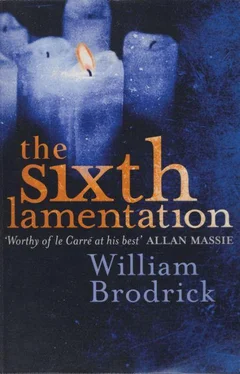William Brodrick - The Sixth Lamentation
Здесь есть возможность читать онлайн «William Brodrick - The Sixth Lamentation» весь текст электронной книги совершенно бесплатно (целиком полную версию без сокращений). В некоторых случаях можно слушать аудио, скачать через торрент в формате fb2 и присутствует краткое содержание. Жанр: Триллер, на английском языке. Описание произведения, (предисловие) а так же отзывы посетителей доступны на портале библиотеки ЛибКат.
- Название:The Sixth Lamentation
- Автор:
- Жанр:
- Год:неизвестен
- ISBN:нет данных
- Рейтинг книги:5 / 5. Голосов: 1
-
Избранное:Добавить в избранное
- Отзывы:
-
Ваша оценка:
- 100
- 1
- 2
- 3
- 4
- 5
The Sixth Lamentation: краткое содержание, описание и аннотация
Предлагаем к чтению аннотацию, описание, краткое содержание или предисловие (зависит от того, что написал сам автор книги «The Sixth Lamentation»). Если вы не нашли необходимую информацию о книге — напишите в комментариях, мы постараемся отыскать её.
The Sixth Lamentation — читать онлайн бесплатно полную книгу (весь текст) целиком
Ниже представлен текст книги, разбитый по страницам. Система сохранения места последней прочитанной страницы, позволяет с удобством читать онлайн бесплатно книгу «The Sixth Lamentation», без необходимости каждый раз заново искать на чём Вы остановились. Поставьте закладку, и сможете в любой момент перейти на страницу, на которой закончили чтение.
Интервал:
Закладка:
‘Just this once.
‘He seized it?’
‘He did.’
Lucy could not bear it any more. She sidled hurriedly out of her row towards the court doors as Mr Bartlett sat down and picked up his highlighter.
2
The folder was sealed as if it were meant to survive the rough handling of a prying child. Max stared at the unmarked surface, the bands of brown masking tape crossing each other like planks in a garden fence. His fingers held the corners lightly, reluctantly, as if the whole might dirty him.
Anselm had brought Max to the table beneath the wellingtonia tree after he’d arrived at Larkwood unannounced. A thick stubble dirtied his neck and cheeks. He said: ‘The day my grandfather came here, he gave me this.’ Max placed it on the table and drew his hands away. ‘He told me “You’re the only person I can trust, you always have been, but now it matters more than ever before. Keep this safe. Show it to no one. If Victor Brionne is found then bring it to me immediately If not, and I’m convicted, then I want you to burn it. But promise me this; do not open it.”‘
Anselm’s mind tracked back to Genesis and the instruction of the Creator: not to eat the fruit of the tree that gave knowledge of good and evil. Schwermann had played God with the same rash confidence that obedience would be rendered. Max continued: ‘Yesterday, the Prosecution asked for an adjournment. In my guts I knew it was because Brionne had turned up. I’ve just heard a news bulletin. I was right. The Prosecution have closed their case. As we sit here, Brionne is giving evidence on my grandfather’s behalf. I’m meant to have brought this to court’ — he pointed at the folder — ‘but I can’t, not without knowing what’s inside.’ He pushed it towards Anselm. ‘I can’t open it. I’ve brought the one part of him he did not bring to Larkwood.’
Somewhere out of sight, one of the brothers was at work making one of the songs of spring: the unhurried scrape of sandpaper on outdoor timber, a preparation before the laying of paint. Anselm took the folder and carefully pulled it apart. He withdrew three documents held neatly together by a paper-clip. Laid on the table, their corners lifted lightly in the breeze.
The dull blue ink had the slight blurring characteristic of print from an old typewriter. Anselm signalled to Max to come closer, to see for himself.
The first was headed ‘Drancy-Auschwitz’. It carried a list of numbered names and was evidently a deportation register. Before Anselm could scan the entire page his eyes alighted upon a single entry:
4. AUBRET, Agnes 23.3.1919 Francaise
The lower right-hand corner had been signed by Victor Brionne — representing, presumably, either the compilation of the list or confirmation of its execution. Anselm turned it over and saw the faded smudge of ink around the indentations of lettering: the list had been typed upon a carbon sheet. This was the original. Somewhere there was a duplicate. It was an irrelevant detail that nonetheless attached itself to Anselm’s concentration.
Anselm turned to the second document. It was another Drancy-Auschwitz convoy list, a block of names. The dates of birth caught his eye. He stared at distant trees, carrying out a spontaneous horrified calculation. They were all children. Each was marked off as though safely accounted for on a last school trip. And there, near the top of the page, Anselm saw what he half expected to see: a boy called Aubret, aged fifteen months, French, and in the margin a broad, unwavering tick. Again, the paper was signed by Victor Brionne. Instinctively he glanced at its back. Curiously, the page was clean, without the marks of carbon.
Anselm turned quickly to the third sheet. It was an SS memorandum dated 8th June 1942 and appeared to be an interrogation record. Although Anselm could not understand German, the term ‘Judenkinder’ was nauseatingly clear. There was a sub-heading in French within quotation marks, ‘La Table Ronde’. Beneath it was a list of names, roughly a dozen, two of which he recognised: Agnes Aubret and Jacques Fougeres. The bottom of the page carried the signature of Victor Brionne. He turned it over. Once more it was clean, an original text.
Anselm’s pulse raced in disgust. He put the documents back in the folder. The questions sprang forward: why had Schwermann kept these at all… and why had he retained original records, leaving behind a duplicate only in the case of Agnes Aubret?
‘Max,’ said Anselm. ‘Your grandfather has prepared for this trial, right from the start, even before he knew the outcome of the war. These show that Brionne was involved in the betrayal of The Round Table and the deportation system… with those papers you hold your grandfather’s life in your hands.’
Max was blinking rapidly He said in a detached, failing voice, ‘He must be blackmailing Brionne. Whatever Brionne is saying to the court will be a fairy tale… agreed between them fifty years ago.
‘I’m afraid you’re right.’
The soft song of spring played on: the scraping over dry, rough wood. Max bit his lip and said, ‘Before I go to the police… I’ll have to prepare my family, my mother…
‘Would you like me to come with you?’ asked Anselm.
‘Yes.’ The word was barely spoken.
Anselm didn’t want to say what was pressing upon his mind but he had no choice:
‘Max, I don’t want to make things worse but there isn’t much time — you need to speak to the police as soon as possible. The Prosecution will need what you now possess.’
3
‘Mr Brionne,’ said Miss Matthews stonily, ‘you have been very public-spirited, coming forward, it would seem, without any outside compulsion.’
Lucy had slipped back through the court doors to find Mr Penshaw seated and the young woman barrister on her feet.
‘Tell me,’ said Miss Matthews with curiosity, ‘when did you first discover the Defendant had taken refuge in a monastery?’
‘On the news.
‘That would be April of 1995, a year ago,’ calculated the barrister. ‘And you made no effort to contact the police?’ She firmly drew out each word.
Brionne turned to the judge, as if for help. Mr Justice Pollbrook stared back dispassionately
‘When did you first discover the Defendant had been formally arrested?’
‘I… I’m not sure, perhaps it was… er…’ ‘Let me help you. On the news?’
‘Yes, that’s right.’
‘That was in mid-August 1995, four months later?’ ‘All right, yes.’
‘Yet you made no effort to contact the police. Why?’ Once again Brionne floundered, like a man with a map he could not understand.
Miss Matthews pressed remorselessly forward. ‘When did you learn the Defendant had actually been charged with murder?’
‘I think it was the next month.’
‘You are right. Yet you made no effort to contact the police. Why?’
‘I can’t explain…’
‘Why not? It strikes me that you have closely followed this case from the day the Defendant fled his home to the day this trial commenced. Is that so?’
‘I have, yes.’
‘Yet it is only at the last hour you come riding into court to tell us what you know Why now?’
Brionne lowered his head, unable or refusing to answer. Miss Matthews patiently leafed through some papers. She looked up and said without a trace of sympathy:
‘Are you frightened of someone, Mr Brionne?’
Still there was no response.
‘Mr Schwermann, perhaps?’
Brionne became totally still. He held on to the sides of the witness box, controlling his breathing. But he would not speak.
‘All right, Mr Brionne, if you won’t reply we’ll move on, said Miss Matthews contentedly ‘When you finally presented yourself to the police a few days ago, after the trial had begun, you related only one great incident of heroism on the part of the Defendant. Is that right?’
Читать дальшеИнтервал:
Закладка:
Похожие книги на «The Sixth Lamentation»
Представляем Вашему вниманию похожие книги на «The Sixth Lamentation» списком для выбора. Мы отобрали схожую по названию и смыслу литературу в надежде предоставить читателям больше вариантов отыскать новые, интересные, ещё непрочитанные произведения.
Обсуждение, отзывы о книге «The Sixth Lamentation» и просто собственные мнения читателей. Оставьте ваши комментарии, напишите, что Вы думаете о произведении, его смысле или главных героях. Укажите что конкретно понравилось, а что нет, и почему Вы так считаете.












